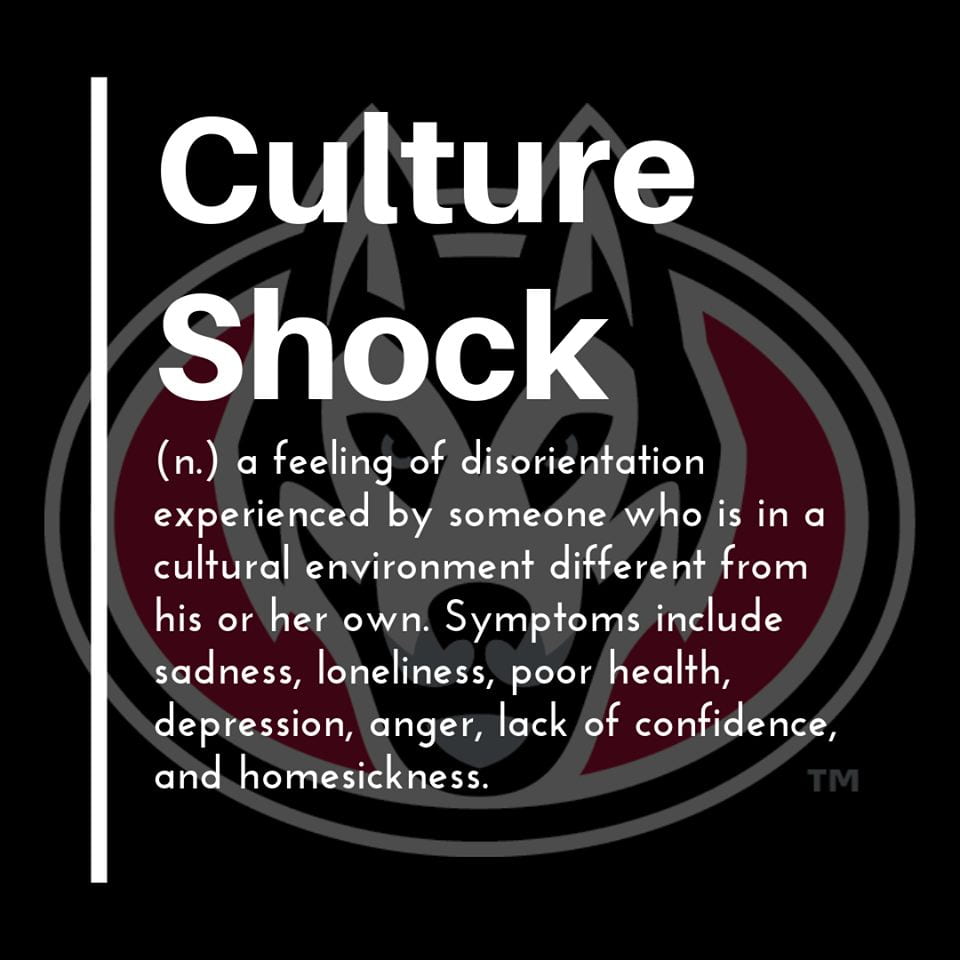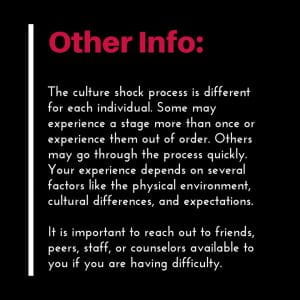Culture Shock
Many international students can have a difficult time adjusting to life in the US. If you are experiencing this, you may be going through culture shock.
Culture shock is a phenomenon that travelers experience when moving from a familiar culture to an unfamiliar culture. Culture shock can be about any or all elements of a culture: the food, new language, climate, etiquette, traditions, or clothing to name a few. It is a complex and emotional experience that involves several stages. It is important to understand each stage so that you can recognize them and minimize the effects. This will make it easier to adjust to college life in the US. In today’s post, we’ll discuss each stage, the feelings you may experience, and helpful tips for dealing with adjustment.
It’s important to know that everyone experiences culture shock differently.Some students may go through the process quickly, while others may take longer. Some people may go through stages multiple times before adjusting. Some people may skip steps altogether. The entire process may take weeks or it could take months. When experiencing culture shock, you may feel lonely, angry, frustrated, depressed, or homesick.
 We strongly encourage any students having difficulty to reach out to school staff or friends. Many universities offer mental health services and have international support staff available to help.
We strongly encourage any students having difficulty to reach out to school staff or friends. Many universities offer mental health services and have international support staff available to help.
There are 4 to 5 stages to culture shock:
- Honeymoon
- Frustration
- Adjustment
- Acceptance
- Re-entry (when you return home)
Stage 1: Honeymoon Phase

In this first stage, you’re excited to be in a new place. You’re looking forward to experiencing the new culture and learning how everything works. You are starting a new journey. You feel positive and curious. You may have even idolized the culture when you were at home.
On short trips, like vacations, the honeymoon phase be the only stage a person experiences. Since international students will be living in the US for a few years, the honeymoon phase will end eventually. Then, the second stage usually begins.
Stage 2: Frustration (the shock)

This is one of the most difficult stages. As the excitement wears off, you may feel frustrated by the new culture. These feelings are completely normal. It takes a lot of work and time to fully understand all elements of a culture. Depending on how long you will live here, you may not have enough time to learn it all. New languages are often the source of frustration at this stage, leading to frequent miscommunication.
You may want to blame problems on the new culture, rather than culture shock. You may start to think of the new culture as inferior. You may feel unusually emotional, like feeling angry, anxious, depressed or homesick. You may second guess your decision to come here. Reach out to friends, family or school staff to help you. Being social and active on campus is a great way to deal with this stage. Like we said before, though, some people experience stages multiple times. You may experience these feelings again. It’s important to find ways to cope with those feelings.
Stage 3: Adjustment

In this step, you will start to gradually adjust to the new culture. You will feel more comfortable in your new environment as you start to learn and understand the values and customs of the new culture. Many students start to have a deeper understanding of how things work. Things become more “normal”. You may find it easier to do things like go to the grocery store, talk to native speakers, ask for directions, and join clubs. You may also start to get used to American food.
As your frustration goes away, making friends will be easier. The more local friends you make, the more you will learn about the culture, making it easier for you to live there!
Stage 4: Acceptance

This is the “final” stage of the process. At this stage, the new culture starts to feel like home. You may now feel like you belong in this new culture. Acceptance does not necessarily mean that you have abandoned your home culture for the new one. Instead, view it as being able to appreciate both your home culture and new culture. You may consider yourself “bi-cultural” at this point.
You may spend months, or sometimes years, until you get to this point. Even when you get to this stage, there may be things you still don’t know or understand about the new culture. That’s okay. What is important is that you feel comfortable enough in the culture to navigate it with ease or find the resources you need easily.
Stage 5: Re-entry Shock (Reverse Culture Shock)
If you plan to return home, you may reach a fifth stage of culture shock. You may have become so comfortable in the new culture that you need to adjust to your home culture upon re-entry. Many students are not prepared for this, so it can be an intense experience.
Being back home may not be what you expected. You may notice changes since you were home, in places and people. You have also changed.You have returned with more knowledge about other customs and now have different experiences. You may feel irritated by those changes and even miss being in the other culture. It’s important to give yourself, and the people around you, time to adjust. Visit with friends you missed during your travels, look for ways to connect to the other culture while at home, or try to meet international students in your own country. Getting back to your routine pre-travel may help also.
Tips for Dealing with Culture Shock:
Although difficult, there are ways to cope with culture shock while in a new country. Preparing for study abroad is key. However, there are many emotions and situations you may not be prepared for. Try doing some of these activities to help you prepare for and cope with culture shock.
- Study the new culture as much as you can, before and after arrival
- Cook favorite meals from home
- Make new friends
- Join student clubs & organizations
- Volunteer
- Stay in touch with family & friends back home
- Challenge yourself to new things each day
- Decorate your dorm with items from home
- Talk with your professors
- Celebrate important holidays in your culture
- Self-care days — do whatever you love most!
- Don’t compare yourself to others
- Focus on the positive & keep an open mind
- Eat healthy and exercise
We hope you find this article helpful. At the IEC, we are here to support our students throughout their experience at our university. Do not be afraid to seek help when you need it. University staff are here to help and are experienced in assisting students from all over the world.
If you want to share your culture shock experience or advice to help other students, leave us a comment below!















